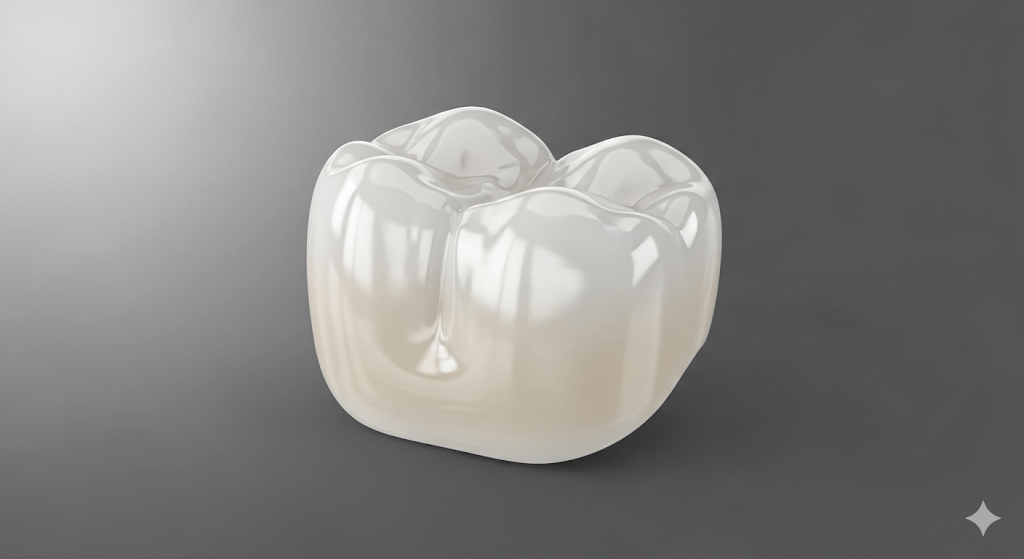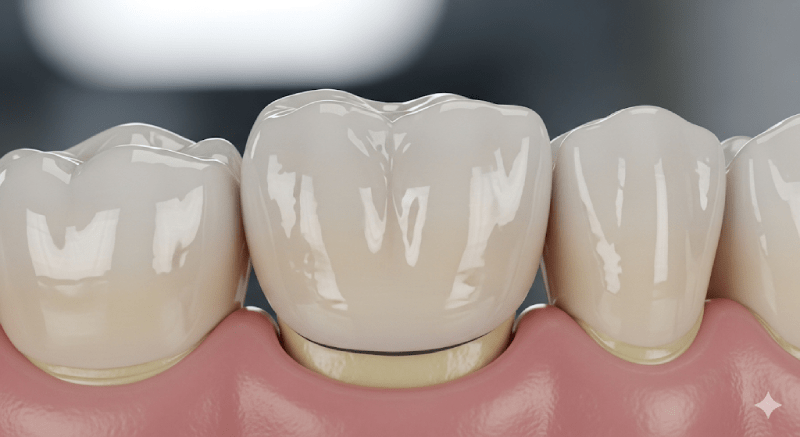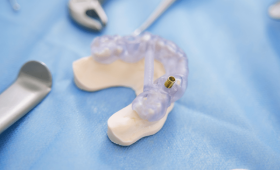What Is A Dental Crown And What Does It Do?
A dental crown, or cap, is an artificial covering placed over a damaged, weakened, or broken tooth. Its purpose is to restore the tooth’s original shape, size, strength, and appearance. Crowns encase the entire surface of the tooth, protecting it from external factors. Dental crowns are an ideal solution for teeth that have lost a significant amount of structure due to decay, have undergone root canal treatment, or have a misshapen form. They are also used to support bridges and implants.
How Long Do Dental Crowns Last?
The lifespan of a dental crown varies depending on the materials used, oral hygiene habits, and regular dental check-ups. On average, a dental crown can last between 5 and 15 years. However, with a high-quality material, proper application, and meticulous care, this period can extend up to 20 years. Regular tooth brushing, flossing, and dental visits are the most important ways to extend the life of your crown.
What Are The Factors That Extend The Lifespan Of A Crown?
The most important factors that extend the life of a dental crown are good oral hygiene and regular check-ups. Brushing teeth at least twice a day, flossing, and using antiseptic mouthwash help keep the teeth and gums under and around the crown healthy. Additionally, using a night guard for people who grind their teeth and avoiding hard foods also extends the crown’s lifespan. A crown made with quality materials and applied correctly will last longer.
What Are The Factors That Shorten The Lifespan Of A Crown?
The most important factors that shorten the lifespan of a dental crown are poor oral hygiene, teeth grinding (bruxism), and the habit of biting on hard objects. Plaque that accumulates at the edges of the crown can cause the tooth underneath to decay and the crown to fall off. Teeth grinding can lead to the crown cracking or breaking. Furthermore, habits like nail-biting or pen-chewing can also damage the crown. Smoking and alcohol consumption can negatively affect gum health, also shortening the crown’s lifespan.
What Are The Most Common Materials Used For Dental Crowns?
Dental crowns can be made from different materials according to aesthetic and durability needs. The most commonly used materials are porcelain-fused-to-metal, zirconium, and all-porcelain. Porcelain-fused-to-metal crowns are strong and cost-effective. Zirconium is a popular option due to its biocompatibility and natural appearance. All-porcelain crowns, on the other hand, offer excellent aesthetic results, especially for front teeth, and contain no metal.
Which Type Of Dental Crown Lasts Longer?
Generally, zirconium and porcelain-fused-to-metal crowns are considered to be longer-lasting due to their durability and resistance to chewing forces. Zirconium is a strong material that closely resembles natural tooth tissue and is highly resistant to fracture. Porcelain-fused-to-metal crowns also show high durability thanks to their metal framework. All-porcelain crowns are more brittle but provide the best aesthetic result.
How Long Does Dental Crown Treatment Take?
Dental crown treatment is usually completed in two or three appointments. In the first appointment, the tooth is prepared and impressions are taken. These impressions are used for the production of the crown in the lab. In the second appointment, the crown is placed on the tooth and its fit is checked. This process can take one to two weeks, depending on the lab’s working time. A temporary crown can be used during this waiting period.
What Should Be Done When A Crowned Tooth Reaches The End Of Its Lifespan?
When a crown reaches the end of its life or gets damaged, it usually needs to be replaced with a new one. The dentist carefully removes the old crown, checks the tooth underneath, and re-prepares it if necessary. Then, a new impression is taken to make a fresh crown. This process varies depending on the health of the underlying tooth.
Can The Tooth Under The Crown Decay?
Yes, the tooth under a dental crown can decay if the edges of the crown do not fit perfectly or if oral hygiene is inadequate. Food particles and bacteria that get between the crown and the tooth can cause decay. Therefore, the proper placement of the crown and regular oral hygiene are vital for the health of the underlying tooth.
If A Dental Crown Breaks, Can It Be Repaired?
A small crack or chip in a dental crown can sometimes be repaired with a composite filling. However, in the case of a large fracture or crack, the crown must be completely replaced. A broken crown can harm the gums or tongue and cannot protect the tooth underneath. For this reason, a dentist should be consulted immediately if a break is noticed.
Do Dental Crowns Cause Bad Breath?
A dental crown can cause bad breath if it is not cleaned properly. Food particles and bacterial plaque that accumulate at the edges or under the crown produce gases that lead to bad odor. To prevent this, it is essential to clean the crown and the surrounding teeth regularly and correctly.
Do Dental Crowns Look Natural?
Modern dental crowns, especially when made with materials like all-porcelain and zirconium, look extremely natural aesthetically. The dentist matches the crown’s color, shape, and size to the patient’s other teeth to provide a natural appearance.
How To Clean A Dental Crown And How To Care For It?
The care of a dental crown is the same as for normal teeth. You should brush your teeth at least twice a day, floss, and rinse your mouth with an antiseptic mouthwash. It is especially important to take extra care of the area where the crown meets the gum line.
What Factors Affect The Price Of A Dental Crown?
The price of a dental crown varies depending on the material used, the number of teeth to be crowned, any additional treatment requirements (e.g., root canal treatment), and the dentist’s experience. Aesthetic and durable materials like zirconium are generally more expensive. For the most accurate price information, a dental examination is required.
Is Dental Crown Application Painful?
During the dental crown application, pain is generally not felt because local anesthesia is used. There might be a slight sensitivity or pain after the procedure, but this condition usually subsides on its own within a few days and can be managed with over-the-counter painkillers.
For Which Teeth Can A Crown Be Made?
Crowns are generally made for teeth that have lost too much structure due to decay, are broken, cracked, have undergone root canal treatment, or have a misshapen form. Crowns are also used to support bridges and implants. Your dentist will evaluate the condition of your tooth to decide whether a crown can be made.
Is Sensitivity Normal After Dental Crown Application?
It is normal to experience cold and hot sensitivity in the teeth after dental crown application. This sensitivity usually goes away on its own within a few days. If the sensitivity persists or worsens, you should consult your dentist, as there might be a problem with the crown’s fit.

Is Dental Crown Treatment Necessary?
Dental crown treatment is often a necessary treatment to protect the health and function of the tooth. Not restoring a broken or damaged tooth with a crown can lead to the complete loss of the tooth. A crown restores the tooth’s strength and protects it from potential fractures.
Who Is Suitable For Dental Crowns?
Dental crowns are suitable for individuals of all ages who have damaged teeth or aesthetic concerns. Your dentist will determine the most suitable treatment method based on the condition of your tooth, your general oral health, and your expectations.
Can Teeth Be Whitened With A Dental Crown?
No, teeth whitening cannot be done with a dental crown. Crowns are not affected by whitening gels. If you are considering whitening your teeth, you should do this before getting the crown. This way, the color of the crown can be chosen to match your other teeth.
How Is A Dental Crown Removed?
A dental crown can usually only be removed by a dentist using special tools. Trying to remove the crown yourself can damage the tooth underneath. If the crown comes off, a dentist should be consulted as soon as possible.
Does Getting A Crown Damage Other Teeth?
A crown, when applied correctly, does not damage other teeth. Crowns only protect and strengthen the tooth they cover. However, in cases where decay forms under the crown due to poor oral hygiene or the crown does not fit well with other teeth, problems can arise with other teeth.
Do Crowns Cause Oral Cancer?
No, dental crowns do not cause oral cancer. All materials used in dentistry are biologically safe and compatible with the human body. They do not pose any health risks.
How Have Dental Crowns Developed Aesthetically?
Dental crowns have shown great aesthetic development thanks to materials like all-porcelain and zirconium, which have replaced old metal crowns. These new-generation materials reflect light like natural teeth and can be designed to be completely custom. This makes the crowns indistinguishable from natural teeth.
What Are The Steps Followed During The Dental Crown Procedure?
The dental crown procedure begins with the preparation of the tooth. The dentist cleans the decayed or damaged parts of the tooth and gives it a suitable shape for the crown. Then, an impression of the tooth is taken using digital or traditional methods. The crown is produced in the lab, and finally, the crown is cemented onto the tooth.
What Kind Of Appearance Does A Dental Crown Provide?
A dental crown provides a natural appearance by staying true to the original color, shape, and size of the tooth. Your dentist performs a detailed color analysis to ensure the crown matches your other teeth and designs the crown to be aesthetically the best.
What Is The Difference Between A Dental Crown and A Dental Bridge?
A dental crown (cap) is used to cover a single tooth, while a dental bridge is used to replace one or more missing teeth and is fixed to the neighboring teeth. A crown is a singular restoration, while a bridge is a structure that fills a missing tooth gap.
What Affects The Price Of A Dental Crown?
The price of a dental crown is mainly affected by the type of material used, the number of crowns, additional treatments, and the geographical location of the clinic. Materials like zirconium and E-max can be more costly, while porcelain-fused-to-metal is more affordable.
What Foods Should Be Avoided After A Dental Crown?
After a dental crown is made, it is important to avoid very hard and sticky foods, especially for the first few days. Foods that can damage the crown, such as nuts, ice, and caramel, should be consumed with caution in the long run as well.
What Should Be Done If The Dental Crown Gets Loose?
If your dental crown becomes loose or comes off, you should consult your dentist immediately. You should not try to glue the crown back on yourself. The dentist can re-cement the crown or make a new one if necessary.
How Many Years Of Warranty Is Given For A Dental Crown?
The warranty period for dental crowns varies from clinic to clinic and according to the material used. Generally, a warranty of one to five years is given for quality crowns. The warranty period depends on regular check-ups and proper care conditions.
Can Jaw Pain Be Experienced With A Dental Crown?
A poorly made dental crown can disrupt your chewing pattern and cause jaw pain. If you experience jaw pain after a crown, it is important to consult your dentist immediately to have the crown adjusted. A proper crown improves chewing function and supports jaw health.
Why Should I Prefer Cure Holiday For Dental Crown Treatment?
Cure Holiday brings together the most modern technologies and expert dentists to offer you the best dental crown treatment. With its transparent pricing policy and personalized treatment plans, it makes your dental treatment experience in Turkey comfortable and reliable. You can choose Cure Holiday to have a healthy and aesthetic smile.
What Should I Do If I Have Other Questions About Dental Crown Treatment?
For any questions you may have about dental crown treatment, Cure Holiday specialists are always ready to assist you. You can contact us to get the most accurate information, create a personalized treatment plan, and clear up any questions you have.
Are Check-Ups Necessary After Dental Crown Treatment?
Yes, regular check-ups are very important after dental crown treatment. Your dentist checks the condition of your crown, the health of the tooth underneath, and your gum condition. These check-ups allow for the early detection of possible problems and extend the life of the crown. It is generally recommended to have a check-up at least twice a year.



